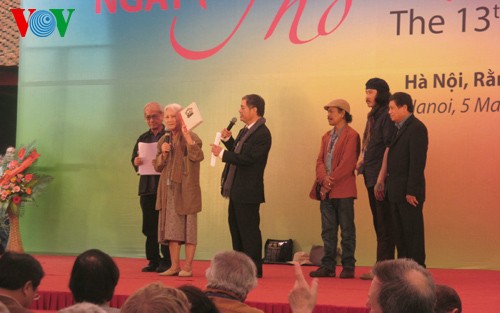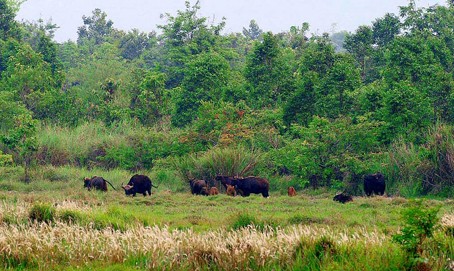A: This week we received an interesting guest from Russia. He is Maxim Kochergin, a listener to VOV in Russian and English. Maxim is a broadcaster on a radio channel specializing in traffic information in Novosibirsk. He hosts a 3-hour program every morning. During a vacation trip to Vietnam, Maxim visited VOV’s station at 45 Ba Trieu, Hanoi. During his short visit on March 6, we had an interesting talk about our programs and his experience of listening to VOV.

Maxim Kochergin (in the center) and some of VOV's staff at VOV's English Office |
A: From Pakistan, Amir Jameel called us on the telephone last week to express his feelings about VOV’s staff. He shared the generous comment that our programs are interesting and excellent. We have become friends on Facebook and he regularly sends feedback after listening to our programs. In his latest email, Amir wrote: “I always feel so great writing to VOV’s English Service. VOV is part of my life. I listen to its informative programs and visit its website every day. I like Vietnam and its people so much. VOV programs provide us information about Vietnam’s history, culture, economy, current affairs, politics, music, and many other topics.”
B: Amir suggested that when we present the news, current affairs reports, or the Letter Box, we should say our names slowly, because our names are very difficult for foreigners to pronounce.
A: Thank you very much for your suggestion. We’ll pay greater attention to clearly pronouncing the names of people and places. Jahangir Alam Manto from Rangamti district, Bangladesh, emailed us to share some of his old memories. Jahangir first tuned in to VOV in 1989, when he was a student. He was surprised when he received his first QSL, post card, and pennant in 1990. Jahangir told us that he participated in an essay contest on Vietnam's renewal process and his entry won a consolation prize. Since then he has been a regular listener to VOV.
B: He continued: “Due to my studies and work I didn’t listen to VOV for some years. Then when I listened to VOV again, I was amazed. The last couple of years I have regularly tuned in to your shortwave station and your website. VOV has changed a lot. It has upgraded to a digital format. I really enjoy reading, listening, and watching videos on your web page. Thanks, VOV.”
A: Jahangir, please send us a copy of the QSL card we sent you 25 years ago, and we’ll send you a gift to honor your long time listening to VOV. We hope you will participate in our current contest, which marks several important events in Vietnam this year.
S.B. Sharma of India wants to know more about Vietnamese poetry after listening to news reports about Vietnam’s Poetry Day and events to promote Vietnamese literature.
 |
| Vietnamese and foreign poets introduce their poems at the festival |
B: The launch and main activities of Vietnam’s 13th National Poetry Day were held last week at the Temple of Literature in Ha Noi, Vietnam’s first University. At the same time, Vietnam hosted the Asian Pacific Poetry Festival and the Conference to Introduce Vietnamese Literature. Poetry lovers of all ages and 150 foreign authors listened to recitals by domestic and foreign poets.
A: The theme of this year’s festival was "Heading to the Country's Sea and Islands", so Vietnamese poets chose to present patriotic works. This was also the first time amateur poets, including military personnel, took part in Poetry Day. Besides reading poems, the event also featured traditional music. Poetry Day has been held in many localities in diverse forms. For example, some Culture and Arts Associations organized an evening for poets to recite their work and chat with poetry lovers by candle light. There was a contest for students to write their favorite poems in calligraphy. Musicians involved in the event set poems to music.

Vietnam's Central Highlands (photo: bienphong.com.vn) |
B: Here I have a question from Dewan Rafiqul Islam of Bangladesh about Vietnam’s forests. Forests in Vietnam can be divided into two broad categories: evergreen trees, such as conifers, and deciduous trees. There are more than 1,500 species of woody plants in Vietnam, ranging from commercially important hardwoods, like ebony and teak, to palms, mangroves, and bamboos. There also are numerous species of woody vines and herbaceous plants.
A: A large part of the forests in the central highlands are dense and rich in broad-leaved evergreens and semi-evergreens, some of which yield valuable timber. Some of this region is still composed of primary forests. There are also secondary forests: open forests, mangrove forests, and barren lands of sand dunes with eucalyptus and small, thorny deciduous trees. Grass and sedge swamps are characteristic of the Thap Muoi, the Plain of Reeds, a low area in the Mekong delta.
 |
Cat Tien national forest in Dong Nai province
|
B: Statistics from the Ministry of Agriculture and Rural Development showed that in 2011 Viet Nam’s forests covered nearly 40% of the total land area. That was a significant increase from 1990 when forests covered only 27% of Vietnam’s land area. The increase in forest was largely due to national reforestation programs and a policy of distributing forestry land to households to manage.
 |
| Tiger in Pu Mat national forest in Nghe An province |
A: The concept of Community Forest Management (CFM) was officially recognized for the first time in Viet Nam with the implementation of the Law on Forest Protection and Development in 2004. Prior to this, however, the government of Vietnam had been promoting CFM for some decades, allocating forest land to households and household groups, particularly to poor, ethnic minorities whose livelihoods are closely linked to traditional, decentralized forest management.
B: This week we continued to receive contest entries from listeners. Many of them are several pages long, which shows the writers’ great effort, enthusiasm, and deep understanding of Vietnam. Thank you very much for your enthusiastic response to our contest. The deadline is in June, so there is still time for you to submit your own impressive entry. Good luck!
A: We welcome your feedback at: English section, Overseas Service, Radio Voice of Vietnam, 45 Ba Trieu Street, Hanoi, Vietnam. Or you can email us at: englishsection@vov.org.vn. Tune in to our English program on the Internet at vovworld.vn. Good bye. See you next time.